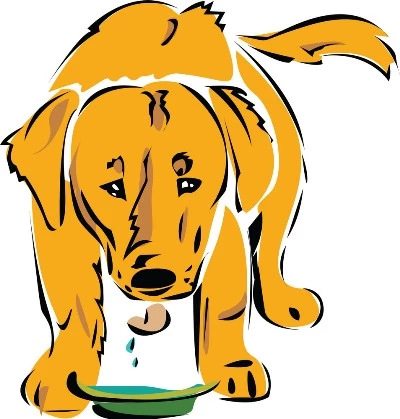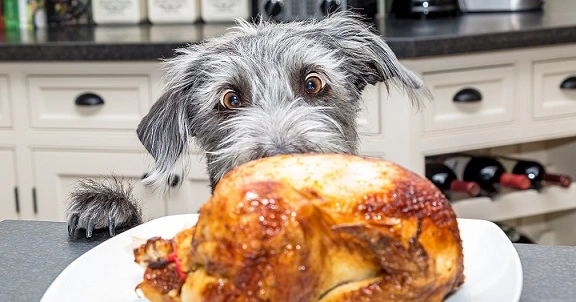can dogs eat cottage cheese? Is cottage cheese bad for dogs?
When it is time for dinner and the family gathers at the table, trust also arrives and with his doe eyes looks at us waiting for something to fall out of our hands. But not all foods intended for humans can also be good for our pets.
Among these, there are cheeses, which are so tempting to our furry four-legged.
While giving your dog this food from time to time is not a sin, there are some cheeses that trusty shouldn’t eat. Let’s find out if dogs can eat Cottage cheese.
Can dogs eat cottage cheese?

Cottage cheese is considered a healthy food for humans, since it is high in protein, low in fat, and may aid digestion.
Despite these benefits, many understandably have doubts about sharing this food with their dog.
Being a dairy product, Cottage cheese could cause a reaction as many dogs to suffer from lactose intolerance.
Giving your dog cottage cheese just for protein is not a good idea.
Sure, your dog’s diet requires this, but dogs need protein from animal sources.
We need to be realistic and remember that this food is a processed dairy product.
Can I give Cottage cheese to the dog?

Some vets recommend incorporating cottage cheese into a bland diet with rice but only in the case of an upset stomach or similar intestinal problems.
If your dog doesn’t have such problems, cottage cheese probably shouldn’t be on your pet’s diet.
In any case, limit the portions or avoid giving ricotta to the dog.
Is cottage cheese Good for dogs?
cottage cheese contains many vitamins, minerals, micronutrients, and antioxidants.
Some people derive many benefits from it, and who would not want their dog to get sources of calcium, potassium, vitamin B12-, selenium, and many more!
Great things can be said about cottage cheese, but it’s not dog-friendly food.
Is cottage cheese Bad for dogs?
Let’s dispel a myth: it is not the cheese that is bad for the dog, but the amount of lactose it contains and the type of processing.
Lactose is the sugar naturally present in milk and is found in most cheeses.
Dogs do not have lactase, the enzyme for digesting lactose, in the right quantities. Because of this, they can have episodes of diarrhea if fed the wrong cheese.

On the other hand, processing can affect the digestibility of the cheese.
I’ll give you a concrete example: Gorgonzola is a cheese with an intense smell, due to fermentation and the development of molds that give it its characteristic streaks.
The nutritional values of 100 grams of Gorgonzola DOP cheese indicate 27 grams of fat and 0 grams of lactose. Fatty cheeses can also be a problem and cause diarrhea or malaise.
Some brands of cottage cheese add milk to the food in question. This inevitably results in an increased intake of lactose which can create upset the dog’s stomach.
The biggest risk you can run in feeding cheese to your four-legged friends is allergic reactions. In fact, if your dog is lactose intolerant, he could be sick.
Like humans, dogs can have severe or mild intolerances, so before giving your dog cheese, make sure he is not intolerant to dairy products.
Can dog eat other cheese?
Cheese is a good source of dietary calcium. Our four-legged friends need calcium for their bones and teeth to grow and remain strong and healthy.
Furthermore, this food is rich in fat but being quite caloric it is important to pay attention to the quantities.
Can Dogs Eat Parmesan and Other Cheeses? In general, yes, although it is better to avoid aged cheeses or those particularly loaded with sodium.
Dog cheese which we can use as a snack or treat

Of course, there are cheeses, which in controlled quantities can be offered to dogs, for example, Parmigiano Reggiano and all parmesan cheeses in general.
In fact, the maturing of these cheeses eliminates lactose and these foods are rich in proteins, calcium, and phosphorus.
Ultimately Parmigiano Reggiano is an excellent cheese to use for dogs.
Even ricotta can be occasionally offered to dogs, since its lactose content is low, only 4 grams in 100 grams of the product if from a cow.
Furthermore, lactose ricotta is readily available on the market, for the intolerant.
What is the best cheese to give to dogs?
1- Swiss cheese
Swiss cheese is a hard, aged cheese with a nutty taste. The recognizable holes are caused by gas bubbles that form during fermentation. The lactose content in this cheese is quite low, so it can be fed to dogs with relative safety.
2- Spun curd cheese
Spun curd cheese is usually just mozzarella that has been manipulated so that the cheese proteins are in a straight line.
This causes the tearing effect associated with this type of snack. From a nutritional point of view, stretched curd cheeses (and mozzarella in general) contain little sodium and lactose.
3- Ricotta
Ricotta is an unpressed cheese that has a semi-solid and yogurt-like consistency. It is also an unseasoned cheese, so less lactose is removed in the fermentation process.
4 – Parmesan
Parmesan is a hard, crumbly cheese with a pungent odor. It is low in lactose, like other hard cheeses.
However, it is generally very high in sodium, so it is not the first choice to give to the dog: if your dog really wants it, I recommend that you give it only a very small dose.
5- Cream cheese
Cream cheese is an unseasoned cheese with high lactose content. As the name suggests, it contains cream, which adds lactose and extra fat.
It is probably best not to give it to the dog. It is difficult to serve and may upset your stomach even if it tolerates other cheeses well.
Cheese Buying Guide –
When buying cheese for your dog, look for cheeses that are low in sodium and also low in lactose both if your dog is lactose intolerant and to prevent him from developing this problem.
Some ingredients commonly added to cheese can be toxic to dogs, so avoid any cheese with added ingredients, especially chives, garlic, or onions.
Obviously, the piece of cheese you feed your dog should be of a size and shape that presents no choking hazard.
What to do if the dog eats cottage cheese?
Even if your dog isn’t lactose intolerant or allergic to milk, cheese can be a problem if your dog eats too much of it.
In the short term, you will notice digestive changes which can include constipation, diarrhea, gas, or vomiting.
If any of these occur, eliminate cheese from his diet and make sure he drinks plenty of water. Speak to your vet about your dog’s specific situation for treatment recommendations.
In the long run, too much cheese can cause problems with obesity, high blood pressure, or pancreatitis, especially if you opt for cheeses that are high in fat and salt.
However, feeding cheese in small quantities does not contribute to the development of these problems.
FAQ
How much cottage cheese should I give my dog?
less than 10% of their dietary intake for the day
Can you give cottage cheese to dogs every day?
If possible try to avoid cheese to feed your dog because it can be dangerous for your dog.
Can cottage cheese give dogs diarrhea?
it is not the cheese that is bad for the dog, but the amount of lactose it contains and the type of processing it cause to your dog as a diarrhea
Conclusion
Friends, I hope You must have liked the blog “Can dog eat cottage cheese? Is cottage cheese good for dogs?“
If you have any feedback, then definitely tell us by going to Contact Us, you can email me or follow me on social media Will see you soon with a new blog, till then stay tuned to my blog “Thanks



